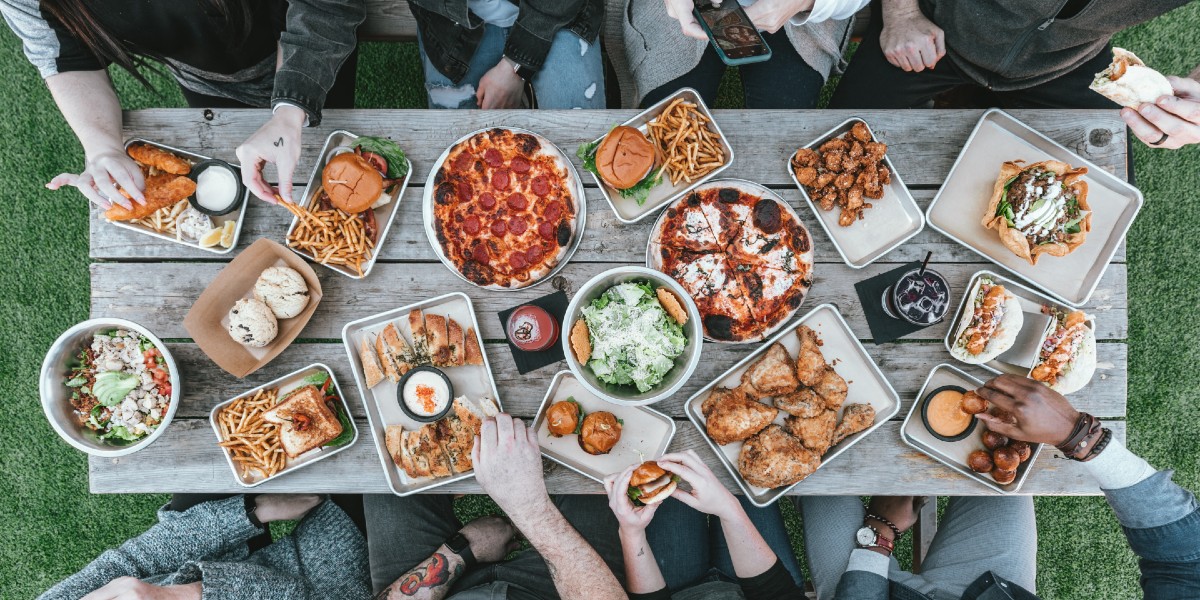“Our food decisions,” writes Dr. Tim Spector in his new book, Food for Life, “are the single most important modifiable factor in preventing common diseases and staying healthy.” But how do we know we’re making the right choices? In this episode, we dig into what scientists like Tim have learned about what we should eat — and why.
Listen to Tim’s appearance on the Next Big Idea podcast below. If you want to listen to this and other episodes ad-free, and enjoy hundreds of audio summaries of the best nonfiction books, written and read by the authors themselves, download the Next Big Idea app.
Food is medicine.
Rufus Griscom: One of the things that’s extraordinary about your new book, Food for Life, is how bold some of the claims are about the importance of diet. You say, “Virtually every common disease has some link with diet, either directly or via the effects of obesity.” Part of the thesis really, right, is that food is medicine. The decisions we make about the food that we eat can profoundly impact our health on a daily basis and our longevity.
“Our decisions about food are the most important all of us can make as individuals—both for our own body but increasingly for the planet.”
Tim Spector: Absolutely. We make hundreds of food choices in a week, and it’s the most important factor in our health. I don’t think we’ve realized that we have this amazing power. Our decisions about food are the most important all of us can make as individuals—both for our own body but increasingly for the planet. Our food choices are the single most important thing we can do for climate change. Put those two together, and it’s pretty powerful medicine for your body and the planet.
What’s good for your gut is good for you.
Rufus: Could we educate our listeners a little bit on the microbiome and what we’ve learned? I was blown away to read that there are as many bacterial cells in our bodies as there are human cells. So we’re, like, half human, half bug.
Tim: That’s right. And every time we go to the toilet and produce a stool sample, we become more human.
Rufus: I feel that way.
“We evolved from these bacteria and microorganisms, and they’ve adapted to live inside our intestines in a nice, warm place doing all the things that we can’t do.”
Tim: The microbiome is this community of microorganisms. There’s trillions of them. And what they’re all doing is they’re all producing chemicals. They’re like these pharmacies. It’s quite hard to grasp for many of us, but they produce the vitamins that we lack. They produce thousands of chemicals that break down our food, and they produce chemicals that make us happy or sad. But, crucially, they are the key to a healthy immune system. The chemicals they’re sending out are sending signals to our immune system, most of which is in the gut, to keep us fighting infection, cancer, and aging.
Rufus: I think you say at one point that pretty much anything that’s good for the gut ecosystem is good for us, and that to some degree we’re feeding our gut ecosystem as much as we are our bodies.
Tim: Absolutely. We evolved from these bacteria and microorganisms, and they’ve adapted to live inside our intestines in a nice, warm place doing all the things that we can’t do. They have 200 times more genes than we do. The reason is—well, there’s no point in humans having all these extra genes if they’ve got microbes to do it for them. So it’s very much part of our bodies. Once you realize that, it’s like you’ve discovered a virtual organ, like an extra liver or something, and we have to now learn the simple concepts of how to look after that organ to make sure it has maximal health and longevity.
Tim’s five tips for healthy eating.
Rufus: How should we be thinking about feeding and cultivating a healthy gut?
Tim: We’ve lost nearly 50 percent of our gut species in the last hundred years when you compare us to hunter-gatherers or people in developing countries who have a much broader range of species, which means they have more chemicals, which means their immune systems are better. What we need to get it back on track is to follow five basic rules:
- Try to eat a more diverse range of plants every week. We did a study between the British gut and the American gut about seven years ago and came up with a magic number: 30 plants is the optimum. It sounds a lot, but you’ve got to remember that each nut and seed, each herb and spice is also a plant.
- Try and eat the rainbow. Brightly colored plants not only have plenty of different nutrients and fiber, but they have these defense chemicals called polyphenols, which used to be called antioxidants. They’re like rocket fuel for your gut microbes. Many slightly bitter, slightly astringent, very colorful things—berries, nuts, seeds, olive oil, and then some unusual ones like dark chocolate, black coffee, and red wine—come in that category.
- Have regular fermented foods. It’s not just your yogurts and cheeses. It’s also kefir, which is fermented milk, and kombucha, which is fermented tea. It’s sauerkraut. There was a study from Stanford that recently showed if you can get people to have five or six very small amounts of fermented food every day, you can—after just a couple of weeks—increase gut diversity and reduce inflammation.
- Give your gut microbes a break. That means give them a 14-hour fast, so you’re only eating in a 10-hour window. The microbes really like that rest time to come out and repair the gut lining. That, again, has been suggested to increase gut diversity and general health.
- The final guideline is to reduce your dependence on ultra-processed food, which is food that doesn’t resemble the original ingredients. The average American gets, we think, about 60% of their calorie intake through ultra-processed foods, and it’s probably 80% in children. All these ultra-processed foods contain chemicals that our microbes do not like.
To enjoy ad-free episodes of the Next Big Idea podcast, download the Next Big Idea App today:































